People discover things all around the world every single day. But while some findings may be relatively small and only hold importance for a tiny group of people or even a single person, others are a lot more vast in every sense of the word.
One of those big discoveries recently happened in Madison County, Mississippi. A man was on an exploration walk when he suddenly came across a huge tusk that appeared to have belonged to a mammoth who lived way back during the Ice Age. Scroll down to find out more!
More info: Facebook
Small fossils are found more often than many of us think, but coming across something as big as a mammoth tusk can turn into a truly stunning discovery
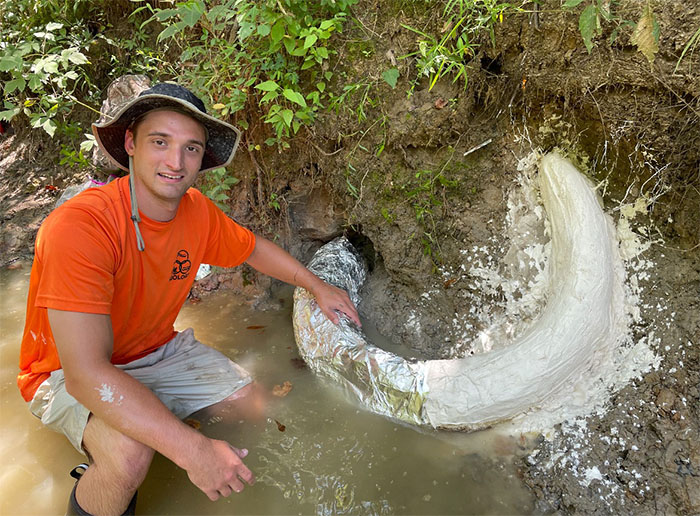
Artifact and fossil collector Eddie Templeton was exploring nature when he came across what appeared to be an extraordinarily well-preserved mammoth tusk
Eddie Templeton is an avid artifact and fossil collector who often takes hikes around nature looking for some things that are waiting to be found. However, few of his discoveries come close to the mammoth tusk that he came across a little over a week ago.
Being as experienced as he was, the man was already aware of the necessary procedures that needed to be put in place in a situation like this. The explorer reached out to the MDEQ (Mississippi Department of Environmental Quality) the first moment he got, and, understanding the situation, the paleontologist team quickly responded.
“Eddie knew that acting quickly on the significant find was important,” shared MDEQ in their press release. “The heat of afternoon summer sun alone could dry a specimen like this out, destroying it, and it could quickly be lost forever.”
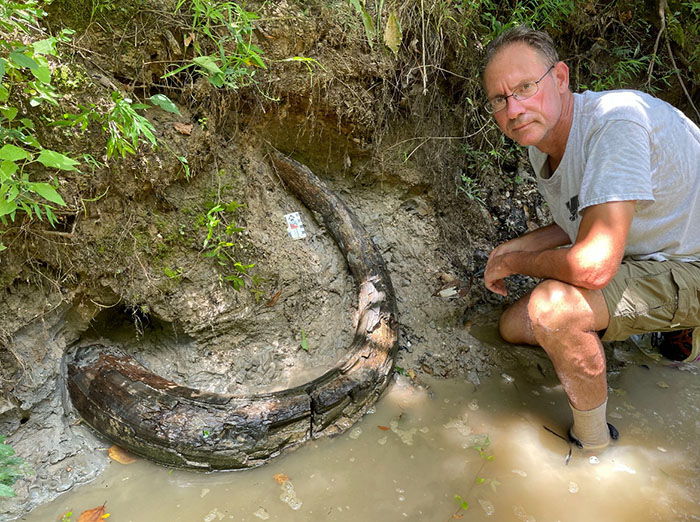
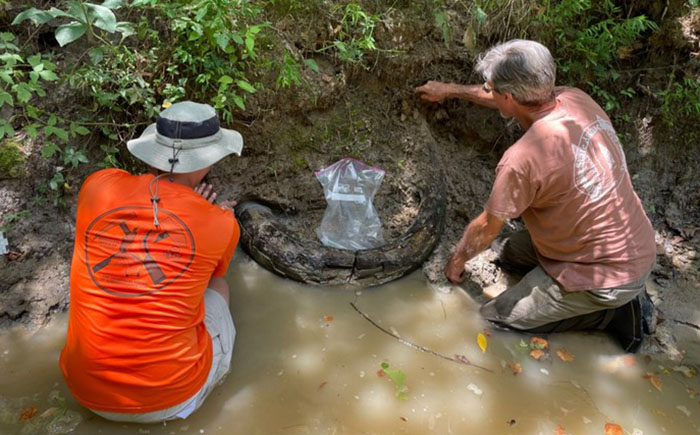
When the paleontological survey team arrived, the tusk was identified as one that belonged to a Columbian mammoth, which had never been found in that area before
Thanks to the tusk’s amazing condition, the paleontological team was able to determine that they were most likely dealing with a Columbian mammoth, which made this finding even rarer as this species had never been found in this area before.
“It was completely covered with alluvium entombing the fossil, possibly the result of a storm resulting in a major flooding event,” MDEQ explained. “The animal likely had died nearby, and its remains were then carried along the stream’s channel.”
Eddie and the survey team spent the whole day dealing with this stunning discovery. They carefully and thoroughly cleaned it up, took pictures, and constructed a protective jacket, which they later used to encase the fossil so that it could be safely removed from the site and brought to the Mississippi Museum of Natural Science.
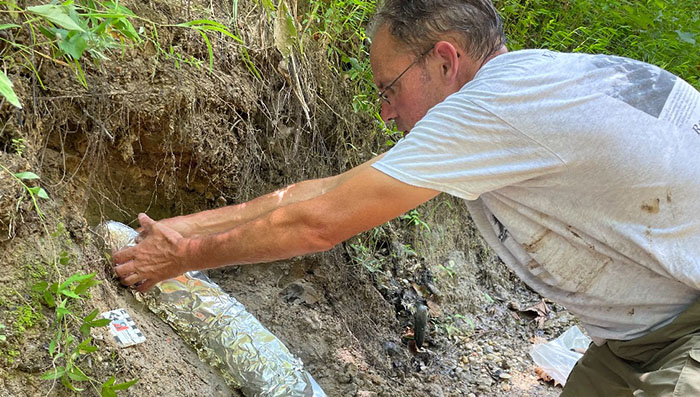
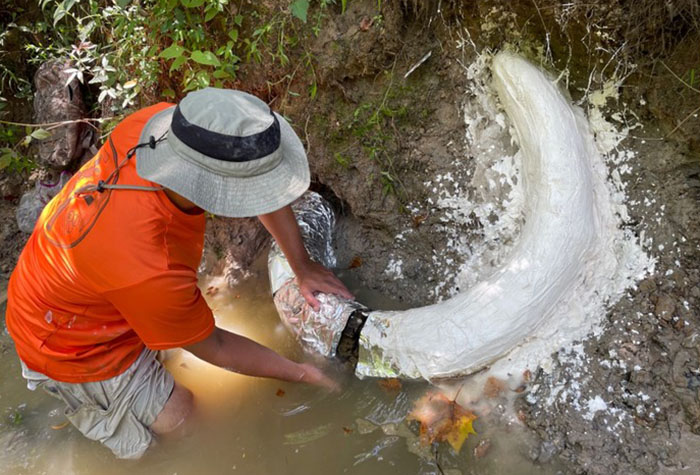
Many humans live out their lives without ever coming across any kind of discovery like this. And even if we would, chances are we would dismiss it, thinking that it’s just some cool log that got buried in the mud.
So, to get a different and a lot more professional perspective on this matter, Bored Panda reached out to a couple of wonderful paleontologists who were glad to share their expertise.
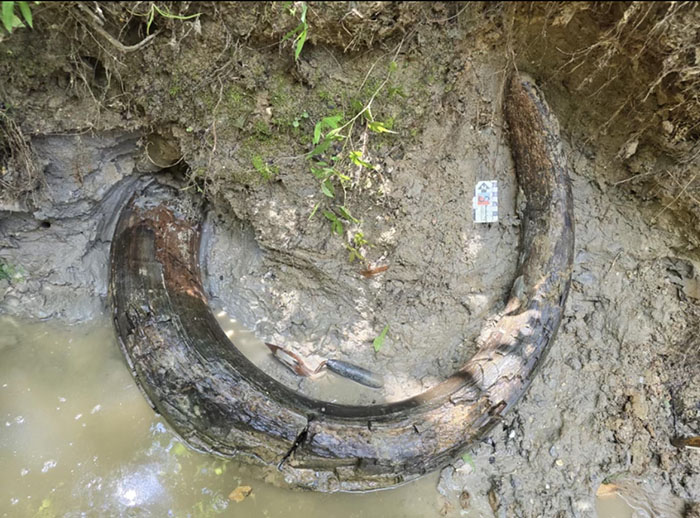
Meaghan Wetherell, who is also the creator of the clothing brand Geopetal Fabric, has been interested in science, specifically in paleontology, ever since she first came into direct contact with it in the 6th grade. As time went by, her interest only grew, which led her to become a field biologist and later a paleontologist.
Joanna Northover, also known as Joannasaurus, has also been interested in this field of science since a young age. However, for her, it all started when she fell in love with dinosaurs. “As I was completing my university studies in paleontology, I discovered my love for museum education and science communication and made paleontology education and outreach my career path,” shared the expert.
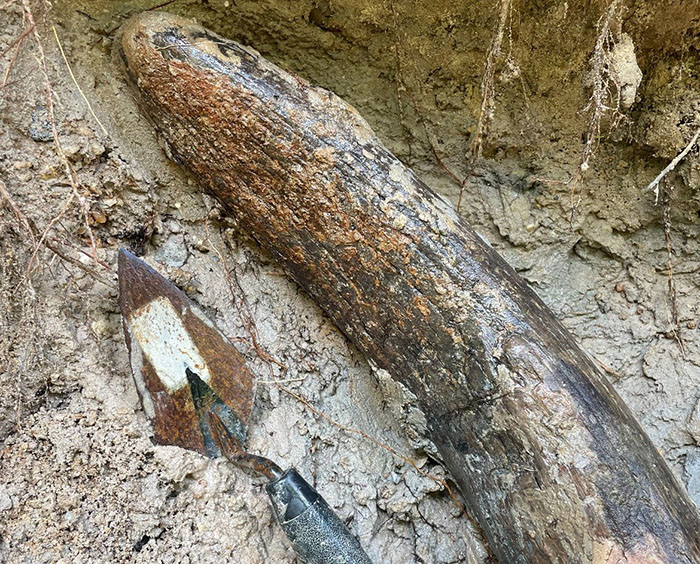
Paleontologists Joanna Northover and Meaghan Wetherell explained that fossil discoveries are a lot more common than most think, but they’re rarely as well preserved as this tusk
When it comes to the question of what the chances of encountering something like Eddie’s discovery are, Joanna explained that it really depends on your location and what kind of fossils you’re looking for. Therefore, certain fossils in certain places may not surprise anyone or bring all that much useful insight, while the same remains found elsewhere might be really groundbreaking.
Meaghan also added that for paleontologists, finding or learning about such discoveries in their area can often be quite a common thing, as she herself encounters something like this roughly once a year. “But they’re often not as nice of fossils as this – more regularly, they’re small scraps of bone. You can still learn a lot from those, but they’re visually a little less impressive,” said the paleontologist, adding that, after all, animals like mammoths lived relatively recently.
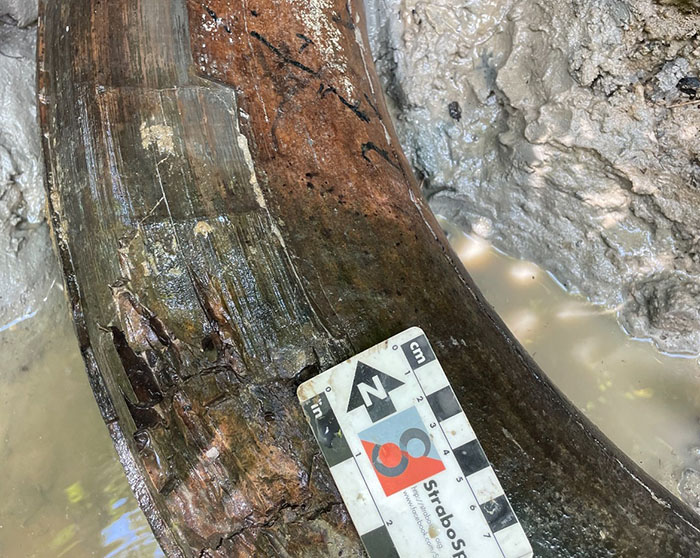
“There’s no magic way to look under the ground for fossils,” continued Joanna, saying that if a person wants to come across any kind of fossils, their best bet is to explore places where rocks are exposed at the surface. Other than that, the only way to increase the chances of finding something is to do research about the area’s geology and past fossil reports.
And yet, discoveries like this have become a lot more common. With the public becoming more and more aware that fossils can be found all around the world, it gets easier for us collectively to cover more ground, as many of these findings are often made by regular folk.
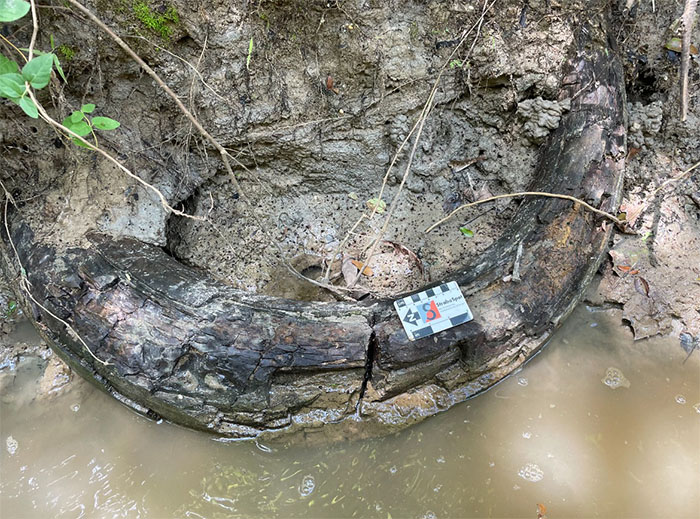
But the amount of fossils being found doesn’t make Eddie’s discovery any less impressive. “The fact that this is a new species to the area is pretty exciting, and it also means some interesting things about the area. Mastodons and Mammoths didn’t always interact because they preferred different habitats,” said Meaghan, explaining how this may mean that this was a place where those different ecosystems intersected or that they lived there at different times.
Both experts also agreed that tusks can be a valuable source of information. The chemical makeup, as well as the tooth structure, can tell us a lot about the animal’s age, how it grew, what it ate, whether or not it migrated, and even what the environment and climate were like.
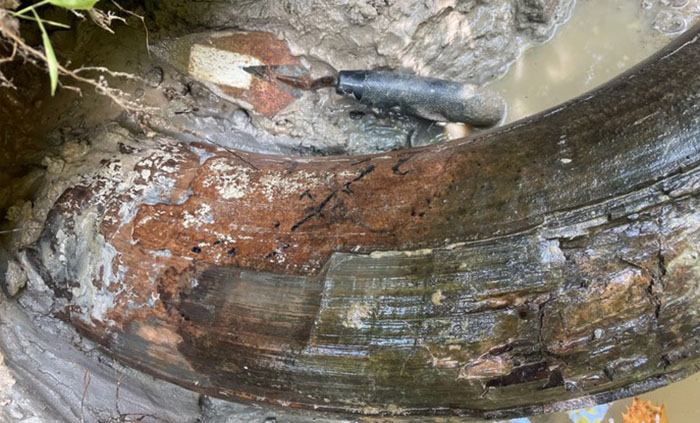
The experts added that if you find a fossil, it’s best to resist the urge to take it home and inform the specialists instead, as you can damage it and lose a lot of valuable information
The paleontologists were sure to leave us with some advice on how to act if you ever come across any kind of fossil yourself:
- Try to ID your discovery by researching it, and inform the closest university/college or your local Natural History Museum of your discovery, as they’re likely to have or know someone who has the expertise to properly take care of your discovery.
- If a fossil is large, like a mammoth tusk, leave it be. It can be easily damaged, and a lot of valuable information can be lost when removing it without proper training.
- Take note of the exact locations where you found the fossil, as well as the exact layer of rock from which it came, so you can return to it if needed and help out scientists studying it.
- Take lots of pictures from all possible angles and of something that could be used as a reference for scale.
- Lastly, it’s best to try and resist the urge to take the findings home. However, if you can’t, some small fossils can sometimes be collected. Be sure to check your local laws, as, in places where it’s forbidden, you risk getting a hefty fine.
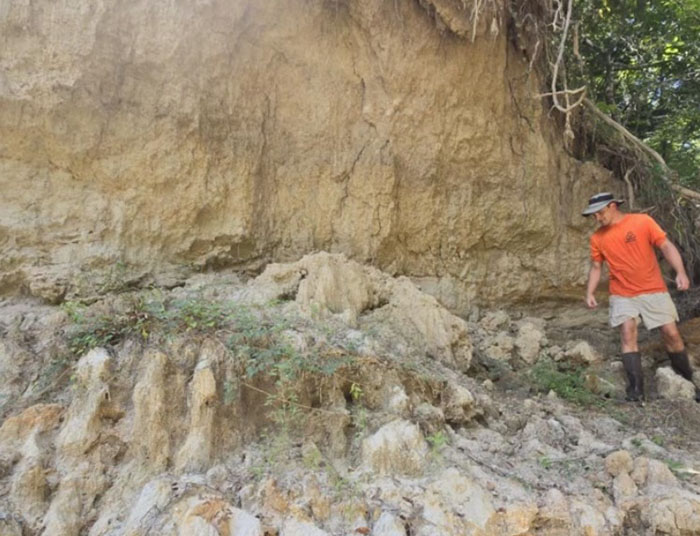
So, in the end, being the seasoned fossil hunter he is, Eddie seems to have done a great job in both finding this stunning mammoth tusk and helping make sure that it was properly taken care of. And while his discovery may not change the world, learning about our planet’s past is important nonetheless. But, of course, you never know. We sometimes learn the most valuable things in the most unlikely places.
What did you think about this story? Have you ever discovered anything similar yourself? Share it all in the comments below!
The commenters were very impressed with the discovery, but there wasn’t a shortage of other stories where people came across similarly stunning findings






















